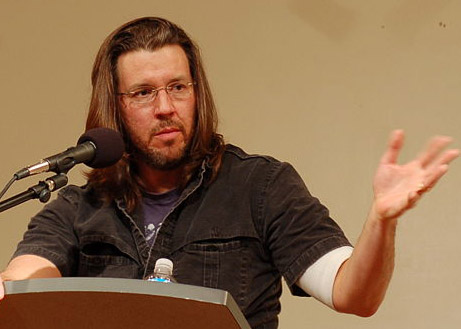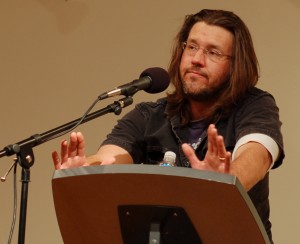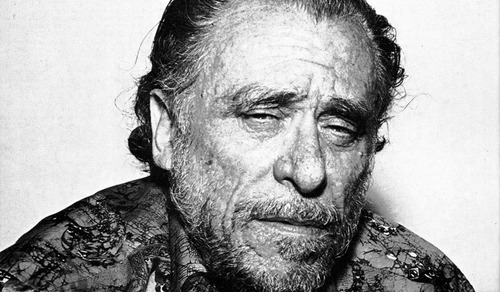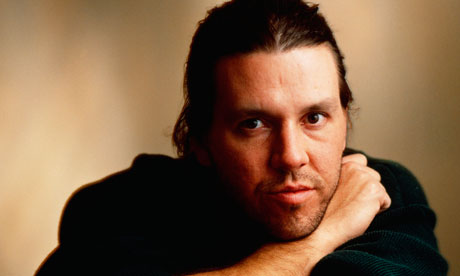 I cannot critique David Foster Wallace. My attempts to do so fall terribly flat. The words read empty. Weightless. And because he thoroughly goes through so many analytic hoops to prove his points, there are no concise, packaged one-liners to hook you into his writing. When he finally does arrive at his best lines, they have been building for pages and it would be cheap to even try to give them away as bones without their meat.
I cannot critique David Foster Wallace. My attempts to do so fall terribly flat. The words read empty. Weightless. And because he thoroughly goes through so many analytic hoops to prove his points, there are no concise, packaged one-liners to hook you into his writing. When he finally does arrive at his best lines, they have been building for pages and it would be cheap to even try to give them away as bones without their meat.
So, without further hesitation, here are my favorite excerpts from his McCain article.
As well as some reading music (if you like).
Do Make Say Think- A Tender History in Rust
UP, SIMBA
From Consider the Lobster by way of Rolling Stone authored in 2000. DFW follows McCain’s Straight Talk Express during the 2000 primaries against George W. Bush.
The conclusion to his introduction:
The other thing I’d note is simply what the article’s about, which turned out to be not so much the campaign of one impressive guy, but rather what McCain’s candidacy and the brief weird excitement it generated might reveal about how millennial politics and all its packaging and marketing and strategy and media and spin and general sepsis actually makes us US voters feel, inside, and whether anyone running for anything can even be “real” anymore- whether what we actually want is something real or something else.
Fourth paragraph.
A better question: Do you even give a shit whether McCain can or ought to win. Since you’re reading Rolling Stone, the chances are good that you are an American between 18 and 35, which demographically makes you a Young Voter. And no generation of Young Voters has ever cared less about politics than yours. There’s hard demographic and voter-pattern data backing this up– assuming you give a shit about data. In fact, even if you’re reading other stuff in RS, the odds are probably only about 50-50 that you’ll read this whole document once you’ve seen what it’s really about- such is the enormous shuddering yawn that the political process tends to evoke in us now in this post-Watergate-post-Iran-Contra-post-Whitewater-post-Lewinsky era, an era in which politcians’ statements of principle or vision are understood as self-serving ad copy and judged not for their truth or ability to inspire but for their tactical shrewdness, their marketability. And no generation has been marketed and spun and pitched to as relentlessly as today’s demographic Young. So when Senator John McCain says, in Michigan or SC, “I run for president not to Be Somebody, but to Do Something,” it’s hard to hear it as anything more than a marketing tactic, especially when he says it as he’s going around surrounded by cameras and reporters and cheering crowds– in other words, Being Somebody.
And when Senator John McCain also says- constantly, thumping it hard at the start and end of every speech and Town Hall Meeting- this his goal as president will be “to inspire young Americans to devote themselves to causes greater than their own self-interest,” it’s hard not to hear it as just one more piece of the carefully scripted bullshit that presidential candidates hand us as they go about the self-interested business of trying to become the most powerful, important, and talked-about human being on earth, which is of course their real “cause,” a cause to which they appear to be so deeply devoted that they can swallow and spew whole mountains of noble-sounding bullshit and convince even themselves they mean it. Cynical as that may sound, polls show it’s how most of us feel. And we’re beyond not believing the bullshit; mostly we don’t even hear it now, dismissing it at the same deep level, below attention, where we also block out billboards and Muzak.
One of the things that makes John McCain’s “causes greater than self-interest” line harder to dismiss, though, is that the guy also sometimes says things that are manifestly true but which no other mainstream candidate will say. Such as that special-interest money, billions of dollars of it, controls Washington and that all this “reforming politics” and “cleaning up Washington” stuff that every candidate talks about will remain impossible until certain well-known campaign-finance scams like soft money and bundles are outlawed. All Congress’s talk about health-care reform and a Patients’ Bill of Rights, for example, McCain has said publicly is total bullshit because the GOP is in the pocket of pharmaceutical and HMO lobbies and the Democrats are funded by trial lawyers’ lobbies, and it is in these backers’ self-interest to see that the current insane US health-care system stays just the way it is.
But health-care reform is politics, and so are marginal tax rates and defense procurement and Social Security, and politics is boring- complex, abstract, dry, the province of policy wonks and Rush Limbaugh and nerdy little guys on PBS, and basically who cares.
Describing the news press (particularly those that work in print) that covered the campaign trail:
–high-end journalists and political-analysis guys from important papers and weeklies and news services and tend to be so totally identical in dress and demeanor as to be almost surreal- twelve immaculate and wrinkle-free navy-blue blazers, half-Windsored ties, pleated chinos, oxfordcloth shirts that even when the jackets come off stay 100 percent buttoned at collar and sleeves, Cole Haan loafers, and tortoiseshell specs they love to take off and nibble the arm of, plus a uniform self-seriousness that reminds you of every over-achieving dweeb you ever wanted to kick the ass of in school.
Henry Wolfe – For The Turnstiles
Sixteen pages later to a section titled WHO EVEN CARES WHO CARES.
It’s hard to get good answers to why Young Voters are so uninterested in politics. This is possibly because it’s next to impossible to get someone to think hard about why he’s not interested in something. The boredom itself preempts inquiry; the fact of the feeling’s enough. Surely one reason, though, is that politics is not cool. Or say rather that cool, interesting, alive people do not seem to be the ones who are drawn to the political process. Think back to the sort of kids in high school who were running for student office: dweeby, overgroomed, obsequious to authority, ambitious in a sad way. Eager to play the game. The kind of kids other kids would want to beat up if it didn’t seem so pointless and dull. And now consider some of 2000’s adult versions of these very same kids: Al Gore, best described by CNN sound tech Mark A. as “amazingly lifelike”; Steve Forbes, with his wet forehead and loony giggle; G.W. Bush’s patrician smirk and mangled cant; even Clinton himself, with his big red fake-friendly face and “I feel your pain.” Men who aren’t enough like human beings even to hate- what one feels when they loom into view is just an overwhelming lack of interest, the sort of deep disengagement that is often a defense against pain. Against sadness. In fact, the likeliest reason why so many of us care so little about politics is that modern politicians make us sad, hurt us deep down in ways that are hard even to name, much less talk about. It’s way easier to roll your eyes and not give a shit. You probably don’t want to hear about all this, even.
One reason a lot of the media on the Trail like John McCain is simply that he’s a cool guy. Nondweeby. In school, Clinton was in student government and band, whereas McCain was a varsity jock and a hell-raiser whose talents for partying and getting laid are still spoken of with awe by former classmates, a guy who graduated near the bottom of his class at Annapolis and got in trouble for flying jets too low and cutting power lines and crashing all the time and generally being cool.
Later on.
A major print journalist commented that, “It’s that he acts somewhat in the ballpark of the way a real human being would act.”
Some brilliant thoughts leading up to that disastrous 2000 election:
–if there’s a low voter turnout, then the majority of the people who get off their ass and do vote will be the Diehard Republicans, meaning the Christian Right and the party faithful, and these are the groups that vote as they’re told, the ones controlled by the GOP Establishment, an Establishment that already has got all its cash and credibility invested in the Shrub (the name McCain’s campaign gave GWB).
A half-page later.
Since Gore, like the Shrub, has his party’s Establishment behind him, with all its organization and money and the diehards who’ll fall into line and vote as they’re told, it’s in Big Al’s interest to draw as few voters as possible into the Democratic primaries, because the lower the overall turnout, the more the Establishment voters’ ballots actually count. Which fact then in turn, the short but highly respected CBS cameraman says (he spends most of the downtime on the Trial speaking with roadies and AV techs), helps explain why, even though our elected representatives are always wringing their hands and making concerned noises about low voter turnouts, nothing substantive ever gets done to make politics less ugly or depressing or to actually induce more people to vote: our elected representatives are incumbents, and low turnouts favor incumbents for the same reason soft money does.
Many pages later.
In other words, a real leader is somebody who can help us overcome the limitations of our own individual laziness and selfishness and weakness and fear and get us to do better, harder things than we can get ourselves to do on our own.
———————————– end of excerpts.
Step Right Up

Most of what was left out was the expounding of circumstantial events.
Because he is so conversational and appropriately lengthy, it’s nearly impossible to paraphrase. His points need all the unique elaboration. I’m positive he dissected every 83-word sentence and concluded that every character was valuable (and I’m sure he fought his editors to keep them).
Writers are supposed to be perceptive to culture/society/etc., self-aware, and mentally alert. I don’t believe anyone has come near Wallace’s level on any account.


 I cannot critique David Foster Wallace. My attempts to do so fall terribly flat. The words read empty. Weightless. And because he thoroughly goes through so many analytic hoops to prove his points, there are no concise, packaged one-liners to hook you into his writing. When he finally does arrive at his best lines, they have been building for pages and it would be cheap to even try to give them away as bones without their meat.
I cannot critique David Foster Wallace. My attempts to do so fall terribly flat. The words read empty. Weightless. And because he thoroughly goes through so many analytic hoops to prove his points, there are no concise, packaged one-liners to hook you into his writing. When he finally does arrive at his best lines, they have been building for pages and it would be cheap to even try to give them away as bones without their meat.